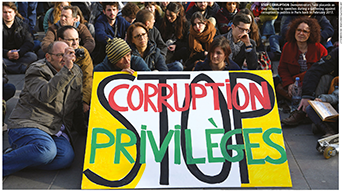VACCINE TRANSPARENCY
ACCOUNTABLE HEALTHCARE
Successful COVID-19 vaccination schemes rest on transparent and accountable healthcare systems – Rajika Jayatilake explains
Corruption has crept into every area of life everywhere. It’s presence in the healthcare sector is especially alarming with the world passing frightening milestones of over 110 million COVID-19 cases and nearly 2.5 million related deaths. As Scottish philosopher David Hume once said: “The corruption of the best things gives rise to the worst.”
 In fact, the OECD estimates that at least 45 percent of global citizens believe the healthcare sector is corrupt or very corrupt. This view is supported by a US National Institutes of Health study, which claims that approximately US$ 455 billion of the 7.35 trillion dollars spent on healthcare annually worldwide is lost to fraud and corruption.
In fact, the OECD estimates that at least 45 percent of global citizens believe the healthcare sector is corrupt or very corrupt. This view is supported by a US National Institutes of Health study, which claims that approximately US$ 455 billion of the 7.35 trillion dollars spent on healthcare annually worldwide is lost to fraud and corruption.
Moreover, Transparency International Health Initiative stated in a recent report that the WHO estimated an extra US$ 370 billion a year would be sufficient to provide healthcare to everyone on the planet. It’s an achievable goal if not for corruption gobbling up the funds.
In healthcare systems around the world, there is widespread abuse of power for private gain including taking bribes and kickbacks, embezzlement, fraud, political influence and nepotism, informal payments, theft of medical supplies and absenteeism – among other immoral and illegal behaviour – which adversely affect equitable healthcare for all.
Even in pre-pandemic times, at least half the world’s population was denied essential healthcare services.
Recognising this overwhelming need, the United Nations General Assembly held a high-level meeting in September 2019 on universal health coverage. It focussed on financial risk protection, access to good essential healthcare plus quality affordable medicines and vaccines for all.
This meeting symbolised a historic recognition of the fundamental right to healthcare for every global citizen.
With COVID-19 creating havoc across the globe since early 2020, the need for transparency and equal healthcare for all took on an added urgency. And as the pandemic raged, scientists, pharmaceutical companies and governments scrambled to develop a vaccine.
Finally, after endless waiting – and yet, with unparalleled urgency and at record speed – some half a dozen vaccines have been developed in the US, the UK, Germany, China and Russia, and cleared by health regulators for emergency use.
The tussle now is to distribute these vaccines to communities across the world – especially to the poor and vulnerable – and ensure that everyone is immunised. The world can’t conquer this disease unless a majority of its citizens are vaccinated – and therein lies the challenge of dealing with corruption in the process.
In commemoration of International Anti-Corruption Day that fell on 9 December, the United Nations Office on Drugs and Crime (UNODC) published a policy paper for member states. It laid down strategies to identify and mitigate corruption risks related to the manufacture, allocation and distribution of COVID-19 vaccines. The World Health Organization also released an extensive plan for fair allocation and distribution of COVID-19 vaccines.
Meanwhile, a student at Harvard Law School Zachary Meskell writes that among the many possible corruption risks associated with vaccine distribution, diversion of vaccines and extortion are the two most significant.
Instead of giving the highest priority to front line healthcare workers and vulnerable people, corrupt politicians, state officials and the wealthy can divert vaccines to their family and friends. Corrupt officials could also misappropriate vaccines by selling them on the black market. The poor and vulnerable could also face extortion in return for vaccination.
However, modern technology in the form of blockchain could play a vital role in minimising corruption in vaccine production and distribution by offering tamper-proof solutions to corruption in a global supply chain.
Blockchain, which is an innovative method of tracing product supplies, is a decentralised ledger system where every new entry can be immediately seen by all participants in a particular supply chain.
Therefore, at any given moment, everyone connected in the supply chain knows exactly where the cargo lies and how much there is. They are also able to verify that no one has interfered with a consignment because the inventory can be tracked with unique codes.
A global vaccination effort such as the one currently taking place is creating the greatest distribution and logistical challenges the world has faced. But there is hope that blockchain technology and AI could help reduce the enormity of the problem.
There is the initial issue of demand forecasting – i.e. deciding how many vaccines to ship, where and when. Then comes supply chain management and monitoring the distribution network for bottlenecks.
As vaccines are administered, there needs to be quality assurance to ensure they’re legitimate and meet the required standard, and right dosage is given. There’s also adverse event surveillance, which monitors unusual side effects. At every turn, what’s vital is transparency and accountability to ensure that the entire process is corruption free.
As author John Maxwell explains, “transparency breeds legitimacy.”




Leave a comment